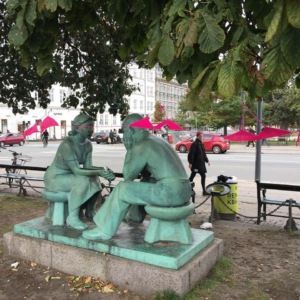News
Pink bras telling stories of breast cancer survivors
This article is more than 9 years old.
Danish fundraisers collecting money for breast cancer research

Talking about breast cancer at Queen Louise’s Bridge in Copenhagen (photo: Bryst Historier)
If you decided to catch the last sunny spells of this year’s unusually warm autumn and went for a stroll across Queen Louise’s Bridge in central Copenhagen on Saturday afternoon, you might have noticed a long string of pink bras hanging in the trees along the way.
The female undergarments are the work of a group of women who came together to knit over 140 bras in a bid to highlight the importance of breast cancer awareness and research.
Dangling from each bra is a small card with a story from breast cancer survivors describing their feelings and experiences with the disease.
The community project Bryst Historier was organised by Elisabeth Stahl and Astrid Louise Brinch with the support of the online yarn store selvstrik.dk.
The bras will hang on Queen Louise’s Bridge and around the capital’s central lakes until the end of this week, during which time people can support the initiative and donate money to the Danish Cancer Society (Kræftens Bekæmpelse).
READ MORE: Danish researches could be closing in on improved breast cancer prediction
A car for supporting cancer research
Yesterday also marked the end of a nationwide fundraising campaign by the Danish radio station NOVA, whose listeners donated a record 2.5 million kroner to Kræftens Bekæmpelse’s efforts in breast cancer research.
“I’m mega proud of both NOVA-hosts’ and NOVA-listeners’ contributions to the entire ‘Pink Ribbon’ campaign,” stated NOVA’s program manager, Mikkel Westerkam.
“In addition to two super pools, we included NOVA’s very own ‘Hits4Tits’, which gave listeners the opportunity to request music for money.”
Money in the two super pools was collected via SMS, through which listeners supported the campaign with 150 kroner and were automatically included in a competition for great prizes.
The winner of the first super pool was Vibeke Østergaard from Jutland, who won a brand new Ford Focus valued at 240,000 kroner.






































